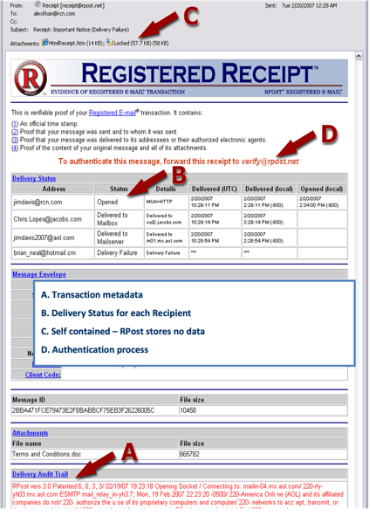
From a mediator, arbitrator, or judicial officer perspective, one looks at the evidentiary value of what is submitted — how much they can trust the information. Evidential weight is about reducing uncertainty surrounding the evidence. The party with the greater evidential weight will win in most cases, or at least mitigate its liability. The Registered Receipt email record puts the sender in a position of advantage, as the evidential weight of their Registered Email receipt is stronger than the evidential weight of standard email, prints of email or attachments, or records of what may have been claimed to have been sent or received, submitted by the other party. Registered Email records provide verifiable and irrefutable records of the entire email transmission (content and time sent and received). This is comparable to the record of delivery that a courier or certified receipt mail service may provide.

Rather than simple email tracking, the Registered Email service provides the sender the means to demonstrate to any party not simply that a message was sent and received, and precisely when, but what the message and attachments said. Here, the ‘proof’ element gives value for when (or if) the email transmission needs to be shared with outside parties and provides evidence as to precisely what transpired by email. With “proof,” senders retain a record of “who said what to whom and when” in an easily portable and verifiable form, ready in case one needs to demonstrate facts to outside parties. Without proof, senders only have some visibility into the email transmission but lack the capacity to irrefutably re-play the facts as to exactly what was sent and received by email, and the precise time of receipt – protecting the sender in case of a dispute.
The decision on admissibility into evidence rests with the judge or arbitrator if the document’s integrity is challenged. He or she will review the record to determine whether the evidence proves authenticity. The Registered Email service packages the email record – the Registered Receipt email — so that it has all the components of “best evidence.” This will be discussed further below.
There is no third-party storage requirement for Registered Receipt email records – for authentication or reconstruction of the original message content, timestamps, or audit trail.
Contact our integration team to learn more about how you can add Registered Email™, RMail, and RSign services to your workflows.